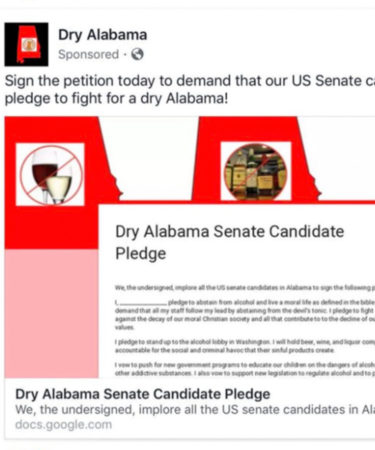In a dramatic 2017 Alabama Senate race between Republican Roy S. Moore and Democrat Doug Jones, parties pulled out their proverbial shots. Jones ultimately won the U.S. Senate seat vacated by Jeff Sessions, with Moore losing by a slim margin. More than a year after the election, however, it’s been learned Democrats had a special, “Russian-inspired” trick up their sleeve: a faux Facebook campaign.
The social media campaign, “Dry Alamaba,” included a Facebook page, targeted ads, and a Twitter account pushing anti-alcohol rhetoric and pledges in support of Moore, a Baptist whose abstinence was a point of pride and political tool throughout the election. The ads, created by progressive Democrats, aimed to sway on-the-fence Republicans — business-oriented publicans, in particular — to vote left in fear of a boozeless future.
Several organizations and individuals were behind the stealth campaign, including Matt Osborne, a veteran progressive activist, the New York Times reports. Posts said things like, “Pray for Ray Moore,” “Democrats continue to put party before country,” and “Re-enact Prohibition and make Alabama dry again!”
The faux campaign was brief, but achieved 4.6 million views on Facebook posts, which were “liked” and shared 97,000 times. Videos were watched 430,000 times. A petition called on candidates to “take the pledge to fight for a dry Alabama!”
How much did Dry Alabama really affect the election, though? Probably not much — Moore’s loss likely had more to do with multiple accusations of sexual abuse than his drinking preferences — but still, the sly social media strategy on the side of the Democrats raises ethical questions. Posing as another party or person is against Facebook’s “community guidelines,” but it’s not illegal, and tactics like these are a well-known reality of political elections. (Russia, amiright?)
At the end of the day, we’re glad Alabama didn’t go “dry.” After all, it’s home to one of our favorite breweries. This revelation does leave us thirsty for transparency, though, when it comes to political ads in our social feeds. But alas, like hazy IPAs, it’s unlikely they’re going to fade any time soon.
